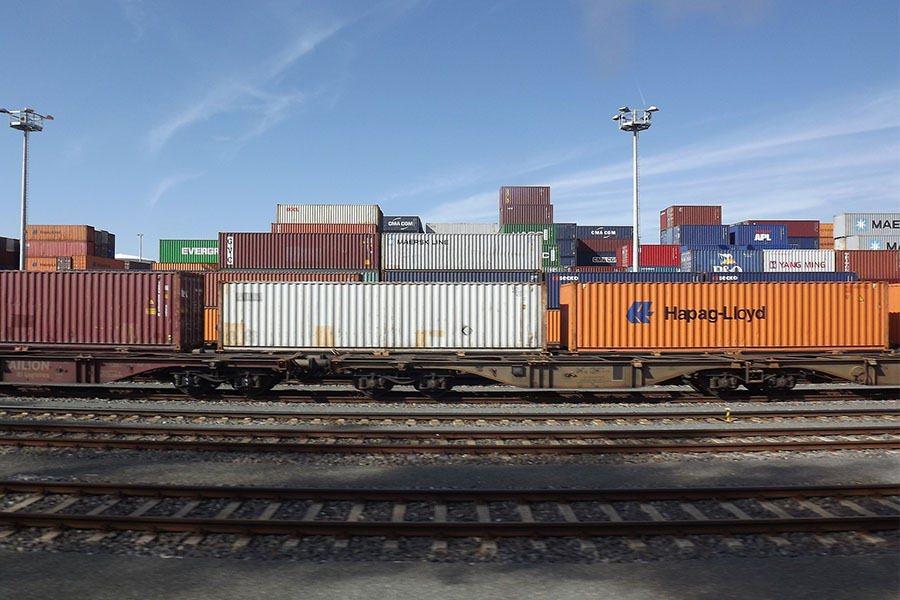
CMU Researchers Suggest Shifting Freight to Rail, Water to Reduce Emissions
Transporting freight by road accounts for around seven percent of the world’s total energy-related carbon dioxide emissions. Recognizing that heavy road freight is particularly hard to decarbonize, Carnegie Mellon University researchers have published a paper to review the ways that goods can be transported via alternate means, such as by rail or water, to reduce both emissions and energy use.
In a recent paper, “Decarbonizing intraregional freight systems with a focus on modal shift,” published in Environmental Research Letters, a team of Carnegie Mellon Engineering and Public Policy (EPP) researchers, led by EPP Ph.D. student Lynn Kaack, explore strategies for decarbonizing freight transportation and policies to encourage the shift. The team also included Wilton E. Scott Institute for Energy Innovation faculty affiliates Parth Vaishnav, M. Granger Morgan, and Inês Azevedo.
The paper assesses the opportunities and barriers to decarbonizing freight by using several different strategies: reducing the demand for freight, optimizing vehicle use and loading, increasing the efficiency of these vehicles, decreasing the carbon content of fuel used to transport freight and shifting freight to low carbon-intensity modes of transportation. The authors refer to this last strategy as a modal shift—the primary focus of their paper.
“We emphasize that the deep decarbonization of the freight sector can only be achieved by combining modal shift with multiple other strategies, such as energy efficiency, switching to fuels with low or net zero carbon emissions, and improving operational efficiency,” they wrote in the article.
The researchers state that it’s very difficult to lower the demand for freight transportation. Further, they say it is not even clear that doing so is desirable, since the transport of goods is linked to economic vitality. The transportation sector could reduce its emissions by routing and packing trucks more efficiently and training drivers in efficient driving techniques. However, to truly reduce emissions, policymakers need to incentivize lower carbon-intensity freight.
In the article, the researchers note that transitioning from road-based freight transportation to rail- and water-based shipping often requires some changes in business operations and sometimes even new investment in infrastructure, which cost-conscious firms may be reluctant to make.
For this reason, policymakers have a key role to play. The European Union has chosen modal shift as a primary strategy for reducing freight-related emissions. With some exceptions, like Russia, Australia and Canada, most countries predominantly rely on road transportation.
“In the U.S., railroads own their own tracks, so they have to build their own infrastructure,” said Vaishnav, an assistant research professor in EPP. “Trucking uses public infrastructure, but does not bear the full cost of the damage heavy trucks do to roads and other infrastructure and indeed to the environment.”
According to the article, rail and inland water are less carbon intensive than roads, but inland water may in some places produce more carbon emissions than rail and ocean shipping. Although many rail systems in the world are electrified, U.S. freight trains run on diesel. The team of researchers suggests we could lower our emissions further by electrifying our rail systems, although this is very costly. In a similar fashion, electric vehicles and electrified roadways could also decarbonize road freight, although this is also expensive and the technologically is difficult to achieve.
To encourage transitions to these lower-carbon options, the team recommends that policymakers put in place incentives to discourage road freight through tolls and taxes and they should support the construction of intermodal terminals that allow for shipments to be kept on rail as long as possible, before being efficiently and reliably transferred to road for last-mile delivery.
Kaack says that many regions of the world are not taking policy approaches to encourage a modal shift from road to rail or water.
“Freight transportation is responsible for a large share of greenhouse gas emissions,” she said. “We urgently need a stronger political focus on decarbonizing freight.”